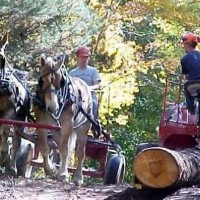
To find out, head to the Grand Oaks Resort in Weirsdale, Florida on Saturday, February 16, 2013, for a “first time ever in Florida”:
“Horse Logging in ‘Downeast’ Maine in the 1960s:
Yesterday’s Technology for Today’s Times”
Live Demonstration & Exhibition
By Bob Giles, Clinician, Champion Horse Driver
Saturday, February 16, 2013
at the 2013 GRAND OAKS CLASSIC
Grand Oaks Resort, 3000 Marion County Rd., Weirsdale, FL
Grand Oaks Resort phone: 352-750-5500
THE STORY:
I recently visited Bob Giles upon learning he had hand-built a very unusual horse-pulled agricultural device. He showed me a primitive, authentic, hand built, horse-drawn logging wagon. I asked him to describe in detail this fascinating wheeled contraption I nicknamed the “Paul Bunyan-mobile”. I also asked Bob what inspired him to build it, and why.
Bob Giles explains:
“I decided to build a horse-pulled logging cart/wagon, in the traditional, primitive way. This is how men built them when I was growing up in ‘Downeast’ Maine. It is made to be to be pulled by a pair of draft horses. In the fall of the year, we would go to the junkyard and gather what we needed to make a wagon to go into the woods (to gather up wood for fuel and building things around our farms and ranches). The unusual contraption of a wagon you see here, I made of the following materials:
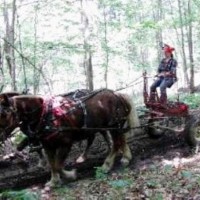
Bob explained to me that he believes his wagon is representative of a “piece of history” needing to be preserved. Its origins, he believes, are from where “his people” (as he refers to them) come from, in “Downeast” Maine.
Bob adds: “Yes, and not just in ‘Downeast’ Maine. You would find a hundred of these types in the woods any place in New England. And the thing of it is: you didn’t buy anything new, because you knew while logging you were going to be on a rock, a stump, a cradle knoll, a side hill; so every week these wagons are going to be repaired simply from the extreme wear and tear due to the terrain. That’s why you didn’t invest a lot of money: you didn’t have a lot of money to begin with and it was the practice to use materials that were at hand.”
Why is this relevant today, and most of all, why is this relevant here in Florida? The answer could be that what is described today as a relatively “new”, environmentally-friendly technique called “Low Impact Forestry” was actually invented and practiced 50-60 years ago (or more) by those Bob Giles describes as “his people” in Maine and Southern New England. In addition, the wagons and machines were built “way back when” in an environmentally sustainable method, using ALL RECYCLED MATERIALS!
Bob’s mission in reconstructing one of these primitive logging devices, as well as his novel idea to demonstrate the technique at this prestigious driving competition he is competing in next month, is because he ardently believes this uniquely American heritage needs to be preserved.
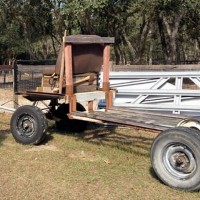
Almost 1/3 of the world’s total land area is covered by forests. Florida’s forests cover a large area of the Sunshine State. Almost one half of the state’s 35.7 million acres is forested. This is more than the total amount of area that makes up New Hampshire, Vermont, and Massachusetts combined! [1]
Before the 1800s, a traveler could go through continuous longleaf pine forests from South Carolina to Florida!
We all benefit from the ecological services that forests perform. Forests purify our water and air, create wildlife habitat, give us natural beauty, and provide recreation opportunities. In fact, a year 2000 study showed that four million people visit Florida’s forests each year primarily for observing wildlife. An additional 234,000 people visited forests to hunt. They contribute around six billion dollars to the economy every year, and support almost 65,000 jobs doing so.
The added worth of water and air purification, biking, hiking, camping, horseback riding, fishing and other forest services to Florida’s economy are huge! Trees around residences, in city parks, along city streets, and in rural areas clean the air of pollutants. Trees also act as sound barriers along noisy roads, reduce heating and cooling costs of buildings, and provide us with aesthetic beauty. Many forest landowners use forest management practices that fulfill each of these needs to get what we need.
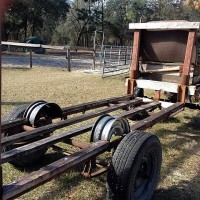
Horses are highly maneuverable, and cope safely and efficiently with slopes and obstructions. Horse logging can work with and complement machine operations, and is not expensive to use. It is labor intensive, takes longer, and is best suited to low volume production, or a landowner willing to invest in the harvest for the long term. However, it also allows for fully selective thinning. It can help with public image, as it does not have the noise and pollution associated with conventional mechanical methods, and the results can be aesthetically pleasing when logged by a responsible operator with an environmental ethic. Horse logging is a viable alternative for people who really care about their forest and the ecosystem.
Logging with horses allows for the freedom of maneuverability while adding an extra element of excitement.
Environmental benefits: Logging with horses is a healthier alternative for the environment. For example, not only does this practice keep more emissions out of the atmosphere, horse hooves don’t compact the soil as much as machinery.
Tradition: Carrying on this enterprise is important for preserving a rich history of working with draft horses. It connects us to farming of the past and propels us forward, by using “Yesterday’s Technology for Today’s Times.”
1 Florida Division of Forestry, Introduction to Forestry in Florida, 2003 Edition
2 Compiled and Reprinted from: Horse Logging in Southern New England, The Conservation Commission of the Town of Woodstock, CT & Rural Heritage Magazine
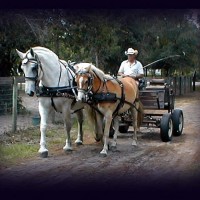
A draft hitch driver since youth, Bob Giles could be found doing farm work and logging in the Maine woods throughout his teen years. Later, he owned and operated a driving horse training center, Gentle Brook Farm, in Maine for 14 years. He was a tour carriage driver at the Arcadia National Park in Maine for several years. He and his wife Brenda then started the Winter Hill Driving Center in Morriston, Florida, on fifteen acres with Florida’s Goethe State Forest, which they operate to this day.
Bob has been involved in educational programs geared towards the novice driver for several years and garnered a reputation for starting horses and people in carriage driving, horse and driver training: singles, pairs, tandem, random & four-in-hand. He has done coaching with four-in-hands of Friesians, Gelderlanders, and Morgan for various clients, and driven and competed four and six-horse Clydesdale hitches.
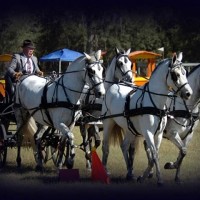
Andrea Migliaccio, Summerland Public Relations: 352-422-3261
email: asummerland@gmail.com
Bob Giles, Winter Hill Driving Center: 352-208-0476
email: mainehitch@yahoo.com
www.winterhilldrivingcenter.com